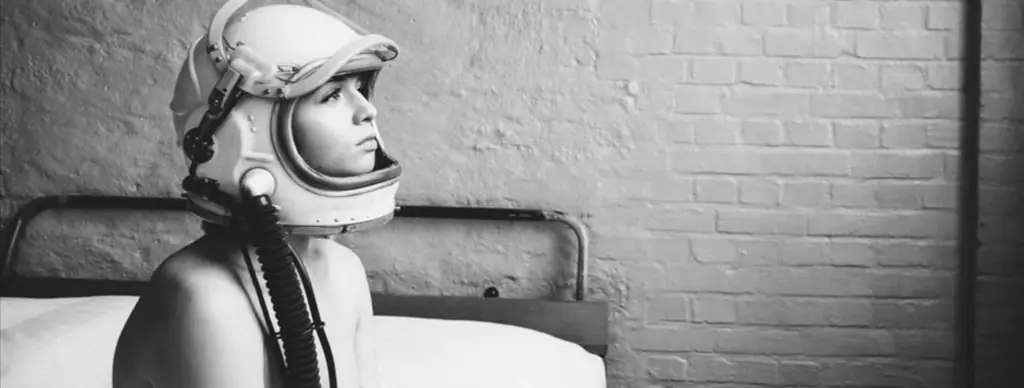- Author Adrian Jeff jeff@psychologosportal.com.
- Public 2023-12-17 05:06.
- Last modified 2025-01-24 14:09.

Phonophobia
From the patient's story: “I have a fear of loud noises. I am especially unhappy with the noise of traffic, which sometimes makes me unable to leave the house and prefer a taxi. Fear of different sounds: screams of neighbors' children behind the wall, barking dogs …”Fear of sharp sounds is called phonophobia, or acousticophobia. To understand its origin, let us pay attention to the psychological characteristics of the patient, which was discussed above. She is a clear representative of the sound vector …
The article is based on a clinical case.
From the patient's story:
I have a fear of loud noises. I am especially unhappy with the noise of traffic, which sometimes makes me unable to leave the house and prefer a taxi. Fear of different sounds: screams of neighbors' children behind the wall, barking dogs. I try to avoid any noise, but it is very difficult to be in silence all the time: the whole world is screaming around. I wear earplugs all the time, and it’s impossible to go outside without them during the day. It is even more disturbing when I am among people who talk a lot or make a lot of noise.
I also hate hearing when people talk about mundane topics, I can't listen to empty talk about food, clothes, and so on. I suffer because of this at work. When I hear the harsh, loud sounds of their speech, I'm afraid my head will burst. The noise makes it difficult to concentrate on work and carry out your duties. Whenever possible, I go out to a quiet place, drink tea, calm down. If there is no opportunity, I endure, I hold my ears with my hands. I am afraid of loud and harsh sounds, and they are everywhere! When it doesn't help, I break down: “Maybe it's enough to yell already? Stop it! " Although in fact I want to say: "Shut up everyone, you prevent me from thinking!" I am afraid of harsh sounds. I’m afraid of going crazy over this. What's wrong with me?
All this at the reception is told to me by a young woman 34 years old. Lonely, closed, not married. Friends, as she herself says, can be counted on the fingers. And she does not strive for communication: "People are so primitive." And all her few friends tend to talk about the meaning of life. Two of them practice meditation. She communicates mainly through correspondence. Her life looks like work-home-work. She shuns big companies and noisy parties. Asks: “Do I have a phobia, fear of loud sounds? What should I do? How is phonophobia treated? Help!"

The history of her life clearly traces the causes of her conditions, which I will comment on below.
The patient grew up with her parents and younger brother. The difference between her and her brother is 14 years. When the brother was born, all the worries about him were given to the older sister - "you are the eldest, so do your work, and we earn money for you and him." Mom and Dad often quarreled, quarreled, father drank. I often heard from my mother the words that she would like a more obedient daughter, that the daughter is not good enough, that it would be better if she was “born different”. Her father told her in childhood that she "will not achieve anything, she will be the same fool as her mother." She grew up on her own, read books, studied, then worked a lot for the family. Even as a child, she avoided noisy crowds and was afraid of sharp and loud sounds.
The patient obediently dealt with household chores and her younger brother. She changed his diapers, walked, taught him to read, checked his lessons. After school, she entered the university with a degree in Computer Science, studied programming. However, she did not finish her education, as her parents decided that the family had little money and sent her daughter to work. MLM, cleaning floors, working in a factory and in an office served as earnings.
The patient now lives with her parents. Father and mother are already retired. The woman often reads books on psychology, from time to time she is fond of spiritual practices, but she is already disappointed in almost everything. There is almost no interest in life, only work that you have to go to. The patient shared that recently she began to think about the meaninglessness of her life and about the meaninglessness of the existence of humanity as a whole. He cannot find his place in life, he does not know why he lives.
Why does phonophobia (acoustic phobia) arise - fear of loud sounds?
The fear of harsh sounds is called phonophobia, or acousticophobia. To understand its origin, let us turn our attention to the psychological characteristics of the patient mentioned above. She is a clear representative of the sound vector. A feature of such people is supersensitive hearing, a low hearing threshold. Sounds that are normal to others may be perceived as painfully loud by them and therefore make them want to cover their ears. It's like hitting someone with particularly sensitive skin - it will hurt more than usual. Like no one else, they are sensitive to the meanings of words.
A person with a sound vector is born as an introvert, focused on his internal mental states, and with the right development goes into his opposite - to focus on the mental states of other people, that is, extraversion develops in the sound vector. When a sound engineer grows up in childhood in an unfavorable sound environment, he does not acquire the skill of going out, but, on the contrary, closes in up to selective contact. “I can't communicate with other people, they talk nonsense, they don't understand me,” the woman shares with me.
Thus, if in childhood the sound engineer was traumatized by loud noises, parental scandals, unwanted meanings of words, then he will be more prone to introversion. He will close in himself so as not to hear these sounds and words that traumatize his psyche. This is often one of the causes of phonophobia.
Causes of phonophobia. Features of the sound vector
The very concept of a sound vector explains a lot to people suffering from phonophobia, shows the reasons for their feelings. It also comes to the understanding that their sensations, sound desires are normal, that there are many such people around and that everything that happens to them does not just happen.
The sound engineer is endowed with abstract intelligence, which must be used for its intended purpose, because the psyche requires its realization. If a person with a sound vector is focused on himself and hides for a long time in his states, then he cannot fulfill his natural role - cognition of himself, the psyche, the plan of life. In this case, internal shortages only grow, exacerbating the sensitivity to sounds so much that they become literally painful.
This is how phonophobia arises, a fear of sounds in a person. Nature, as it were, hints to the sound engineer that he should not be focused on himself, that he should be focused outside, that is, on other people.
The problem is that the sound engineer can and would like to, but cannot go outside because of the discomfort caused by the fear of loud sounds. How to be in this case?
What to do when there are no skills for focusing on others, and people around you seem stupid, unworthy of attention and you basically avoid them? How can a sound engineer get out if there is a fear of harsh sounds?
How is phonophobia treated?
The sound vector is the only one that does not have material desires. His aspiration is to reveal the unconscious, what drives people, determines the reasons for their behavior. Studying the mental structure of himself and other people, the sound engineer answers his main question: “Who am I? Why was I born? and finds its purpose in the Universe. This changes his state so much, gives rise to interest in the people around him, that phonophobia recedes.
Many people who have undergone Yuri Burlan's System Vector Psychology training have cured phonophobia, got rid of it forever and are no longer afraid of loud and harsh sounds. The training provides a definition of the sound vector, its states and mental structure. And then the way of filling the mental desires of the sound vector becomes clear. As a result of awareness of the psyche, severe sound states go away: phonophobia, insomnia, depression, suicidal thoughts.

In addition, after the training, stress resistance significantly increases, which helps the sound engineer feel comfortable even in a noisy environment and not suffer from it. Why? Because he acquires the skill of systems thinking, observation, objective vision of the world. The previously introverted sound person is coming out! This allows the assignment of the sound vector and removes the fear of harsh and loud sounds.
Many people also write that they previously did not take headphones out of their ears and could not imagine their life without them, and now, having completed the training in System Vector Psychology by Yuri Burlan, they prefer to listen to the conversations of people on the street. There are also many reviews on hearing improvement, but that's a topic for another article.






